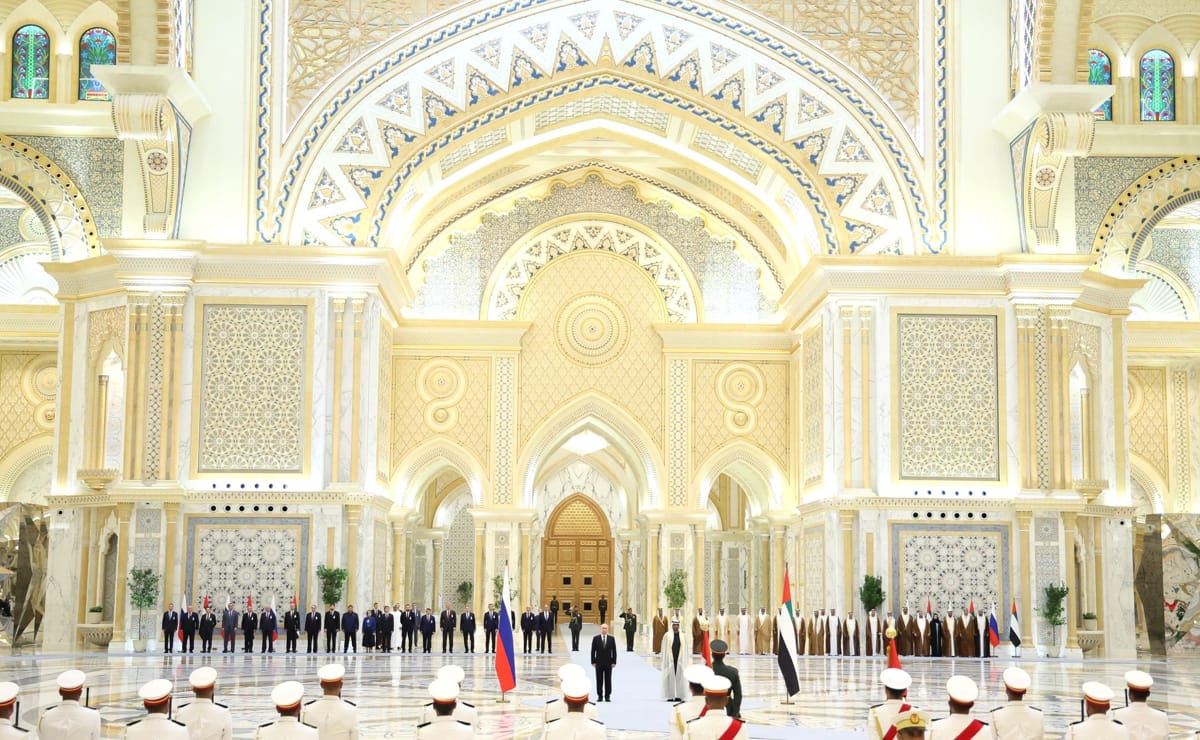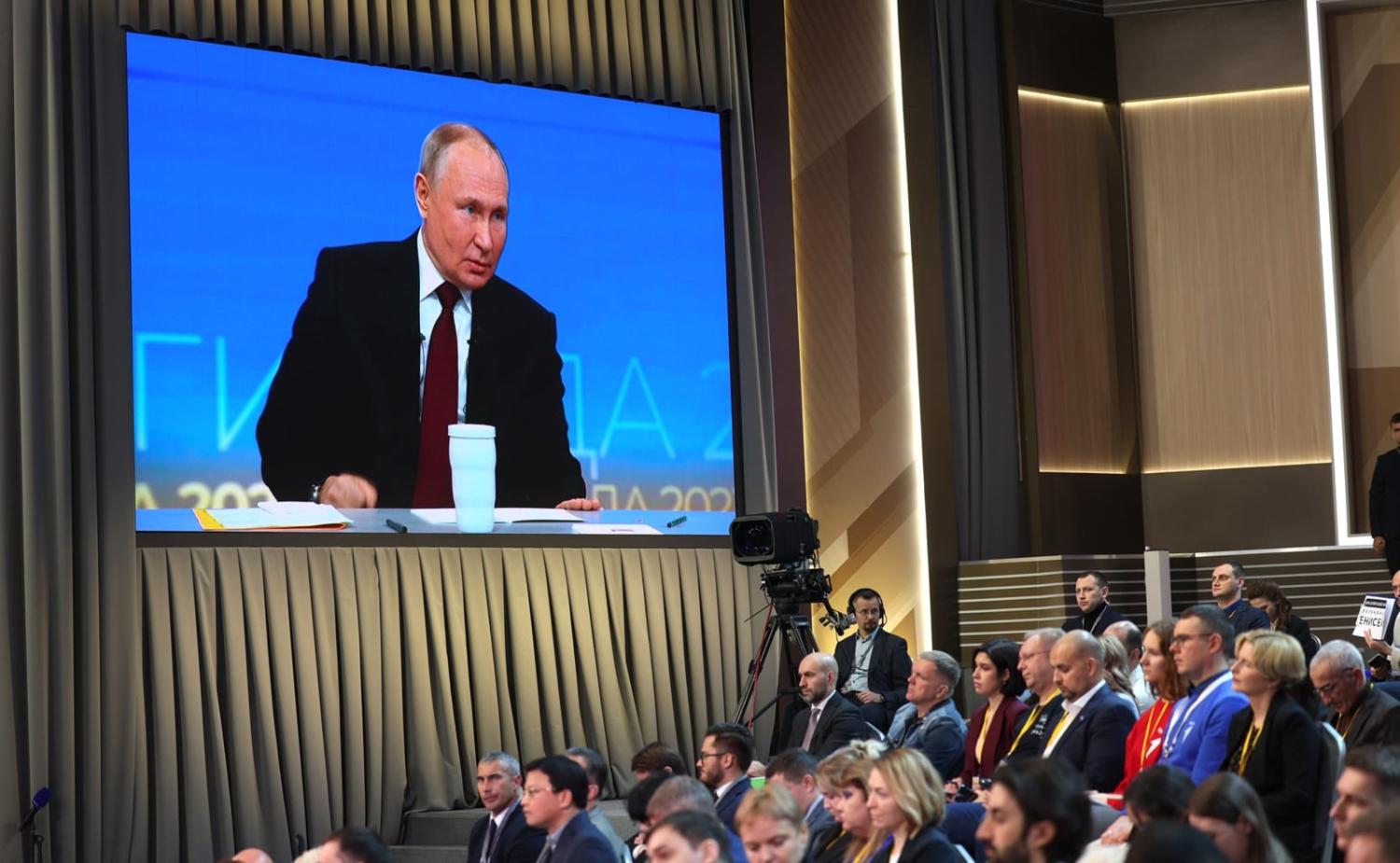As 2023 draws to a close, Vladimir Putin must be surveying the world with some satisfaction and confidence. That’s certainly the impression the Russian President conveyed in his showpiece press conference in Moscow last week.
And, unfortunately, not without reason.
The war in Ukraine may be deadlocked for now, but Putin thinks it’s going Moscow’s way. Russia succeeded in blunting the Ukrainian summer counter-offensive and has now gone back on the offensive.
Russia has rebuilt stocks of artillery shells, missile and drones, assisted by Iran and North Korea but, significantly, also due to ramped up production from Russia’s domestic defence industry, which is now operating essentially on a war footing.
Russia is already stepping up missile attacks again on Ukrainian cities and infrastructure. It will intensify the onslaught over the winter, aiming to knock out Ukraine’s power and water supplies, hoping to paralyse the economy and erode civilian morale.
Meanwhile, Putin is clearly encouraged by signs of flagging support for Ukraine in the West. Despite high-level reassurances of strong backing for Kyiv, both US and EU funding in 2024 hangs very much in the balance. The striking unity and resolve that characterised the strong Western response to Russia’s invasion in February 2022 has frayed, jeopardising vital flows of both military and budgetary assistance for Ukraine.
All this reinforces Putin’s contention that time is on Russia’s side in its war with Ukraine.
Putin believes Russia is more resilient and has greater staying power in the face of outside pressure. He’s confident Moscow can weather Western sanctions, especially with the help of non-Western economic partners.
He calculates that the United States and European countries will eventually tire of the war and pressure Kyiv to compromise and cut a deal with Russia – effectively, on Moscow’s terms. Yet Putin hasn’t changed his objective of bringing Ukraine to heel, by securing a more pro-Russian government in Kyiv and drawing Ukraine firmly back into Moscow’s sphere of influence.
Meanwhile, the war in Gaza has shifted the political and media spotlight away from Ukraine. This distraction plays into Moscow’s hands, making it even harder for Ukraine to sustain support from the West, as President Volodymyr Zelenskyy’s fruitless visit to Washington last week showed.
More broadly, Moscow has been able to sustain, even strengthen, key foreign partnerships vital to Russia’s security and economic interests and objectives – including undermining Western unity.
Russia’s relationship with China is of central importance, although increasingly asymmetric, in Beijing’s favour. China not only shares Russia’s resentment of the US-led international rules-based order, but has become a vital alternative energy market and source of key manufactures.
Meanwhile, India and Türkiye are big buyers of Russian oil, while Iran is providing crucial military drones to Russia for use in Ukraine. Russia’s interest-based and values-free approach to foreign policy, along with its emphasis on multipolarity, challenging US primacy, resonates strongly with all these partners, who take a similarly pragmatic and transactional approach.
Just in the past fortnight, Putin has visited the United Arab Emirates and Saudi Arabia. The UAE is an important economic partner for Russia, including (like Türkiye), reportedly, as a conduit for sanctioned Western goods. Meanwhile, Moscow and Riyadh cooperate in OPEC–plus seeking to manage the global oil market. On his return to Moscow, Putin received Iranian President Ebrahim Raisi in Moscow. Putin also met Chinese, Indian and Turkish investors at a business forum in Moscow.

Such exchanges allow the Kremlin to demonstrate to domestic and external audiences that Moscow is not the international pariah portrayed in the West. BRICS expansion (however questionable its practical utility) is likewise valued by Moscow for its symbolic importance, signalling internationally that Russia still matters and doesn’t stand alone.
Meanwhile, Putin has been able to steady the economy. Despite the Western price cap, oil revenue has generally held up, thanks to sales to non-Western partners – China, India and Türkiye. Economic stability, coupled with tough domestic controls reinforced by pervasive propaganda, has ensured political quiescence within Russia. Surveys indicate the war in Ukraine is increasingly unpopular with Russians but there’s no sign yet this jeopardises the regime’s secure hold on power.
But there are clouds on Putin’s horizon.
The Kremlin’s hesitant and confused handling initially of the abortive Prigozhin mutiny in June suggested the regime might prove brittle when confronted by severe challenges.
And the army’s hands-off approach to Prigozhin’s rebellion has left a lingering question-mark over the dependability of security forces.
While GDP growth this year is expected to reach 3.5 per cent, the economy seriously risks overheating, with annualised inflation running at 7.5 per cent in November, forcing the Central Bank to increase interest rates again. This reflects rising defence spending (around a third of government budget expenditure in 2024) and increased welfare payments, coupled with labour shortages – none of which look likely to change near-term.
Unsurprisingly, Putin has confirmed he’ll be seeking an unprecedented fourth term in next March’s presidential elections. The outcome is not in doubt, of course, in Russia’s tightly managed political system. But elections remain important as a barometer of the public mood. Ensuring a strong turnout is a talisman of political legitimacy. The question, then, is whether discontent with the war and economic difficulties will impact negatively on voter sentiment curbing turnout.
Yet none of these problems seem existential for the Kremlin, and probably don’t keep Putin awake at night.
It’s prudent to expect the unexpected in Russia. But Putin’s apparent confidence going into 2024 is hardly surprising.
And that’s not good news for the West.

